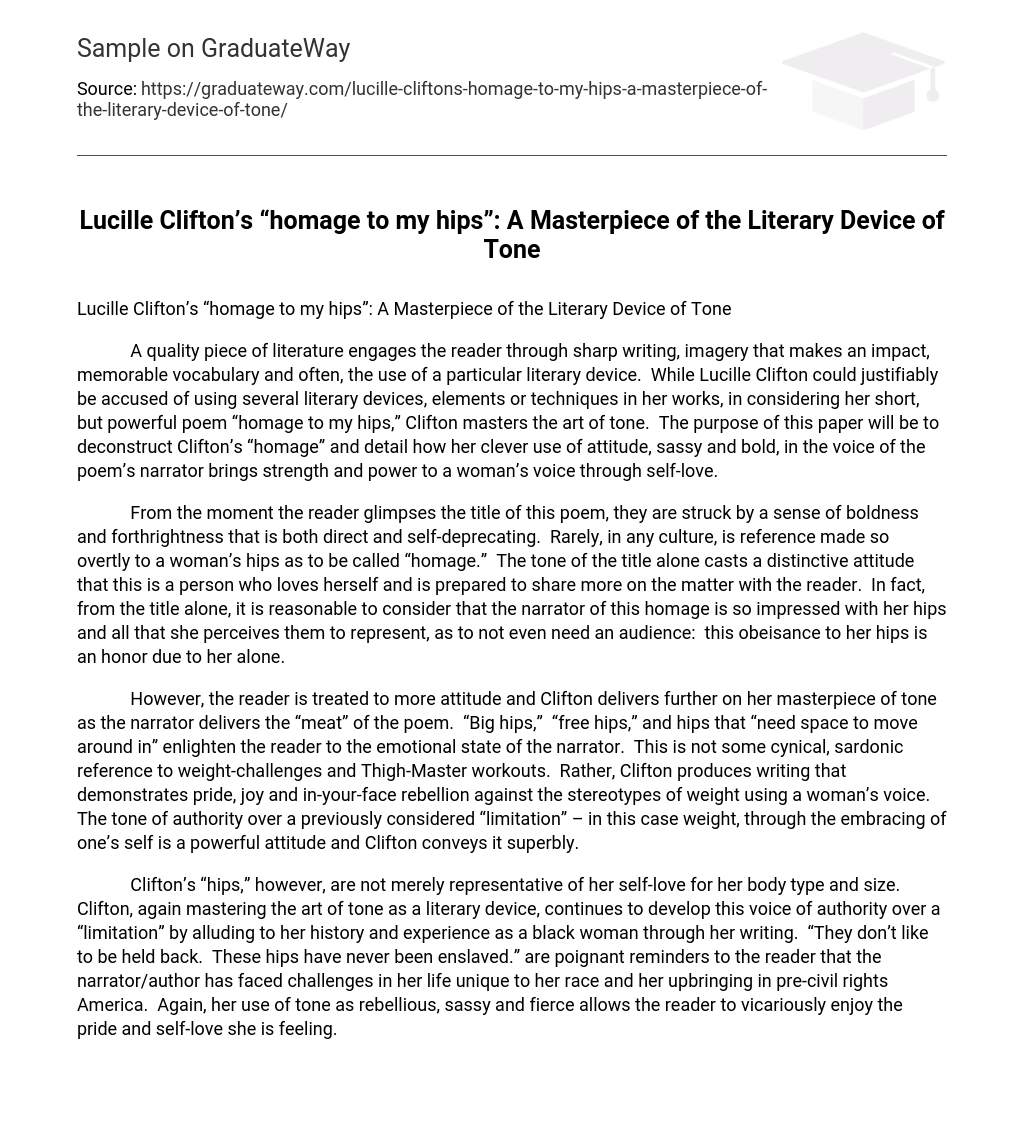A quality piece of literature engages the reader through sharp writing, imagery that makes an impact, memorable vocabulary and often, the use of a particular literary device. While Lucille Clifton could justifiably be accused of using several literary devices, elements or techniques in her works, in considering her short, but powerful poem “homage to my hips,” Clifton masters the art of tone. The purpose of this paper will be to deconstruct Clifton’s “homage” and detail how her clever use of attitude, sassy and bold, in the voice of the poem’s narrator brings strength and power to a woman’s voice through self-love.
From the moment the reader glimpses the title of this poem, they are struck by a sense of boldness and forthrightness that is both direct and self-deprecating. Rarely, in any culture, is reference made so overtly to a woman’s hips as to be called “homage.” The tone of the title alone casts a distinctive attitude that this is a person who loves herself and is prepared to share more on the matter with the reader. In fact, from the title alone, it is reasonable to consider that the narrator of this homage is so impressed with her hips and all that she perceives them to represent, as to not even need an audience: this obeisance to her hips is an honor due to her alone.
However, the reader is treated to more attitude and Clifton delivers further on her masterpiece of tone as the narrator delivers the “meat” of the poem. “Big hips,” “free hips,” and hips that “need space to move around in” enlighten the reader to the emotional state of the narrator. This is not some cynical, sardonic reference to weight-challenges and Thigh-Master workouts. Rather, Clifton produces writing that demonstrates pride, joy and in-your-face rebellion against the stereotypes of weight using a woman’s voice. The tone of authority over a previously considered “limitation” – in this case weight, through the embracing of one’s self is a powerful attitude and Clifton conveys it superbly.
Clifton’s “hips,” however, are not merely representative of her self-love for her body type and size. Clifton, again mastering the art of tone as a literary device, continues to develop this voice of authority over a “limitation” by alluding to her history and experience as a black woman through her writing. “They don’t like to be held back. These hips have never been enslaved.” are poignant reminders to the reader that the narrator/author has faced challenges in her life unique to her race and her upbringing in pre-civil rights America. Again, her use of tone as rebellious, sassy and fierce allows the reader to vicariously enjoy the pride and self-love she is feeling.
The final series of references to her hips and their power involve references to another area of dominance where tone plays a major role in conveying the narrator’s meaning. “Mighty hips,” “magic hips,” and hips that have been “known to put a spell on a man and spin him like a top,” gleefully deliver to the reader firm notice that the lady is “large and in charge” when it comes to men. This, too, is representative of self-love and dominance over a perceived “limitation” – relationships with men. Where women have often been “whore-ified” in literature because of the looseness of their hips, Clifton seeks to deliberately pay honor and respect to this unique symbol of femininity and it’s ability to dominate men when, as suggested playfully by this poem, used properly and embraced fully.
A simple poem about the power of a woman’s hips may not seem a likely battle cry for empowerment for women. However, when crisp writing, as found in Lucille Clifton’s “homage to my hips,” is coupled with the skillful usage of a literary device like tone, the resulting work can be genius. Funny, smart, brazen and yet still very real, Clifton manages to convey emotion and depth to the reader in few words. Truly a masterpiece, “homage” delivers attitude in spades.
Works Cited:
Clifton, Lucille. “homage to my hips.” Retrieved January 5, 2009 from: <http://www.poemhunter.com/poem/homage-to-my-hips/>





